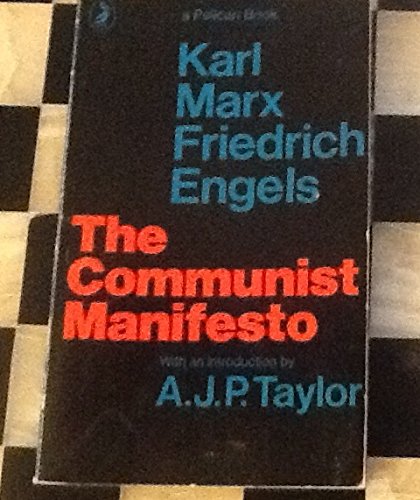-
Manifesto of the Communist Party
Karl Marx, Friedrich Engels
Hardcover (Cosimo Classics, Nov. 1, 2009)Ironically, The Communist Manifesto, first published in 1848 for the Communist League, had little influence in its own day. Only after Karl Marx and Frederick Engels' other writings had made their views on socialism widely known did it become a standard text. For nearly century it was one of the most widely read - some would argue misread - texts in the world. Manifested in vivid prose, the Manifesto continues to irk the capitalist world, lingering as an eerie specter even after the collapse of those governments, which claimed to be enacting its principles. Certainly, the aim here is not create converts. Instead it is to help readers probe the writing with its distinct point of view, so that we might understand the political and historical significance of the text while still maintaining a stance that allows us to think critically about the subject and form our own opinions.
-
The Communist manifesto
Karl Marx
Mass Market Paperback (Appleton-Century-Crofts, Jan. 1, 1955)None
-
Communist Manifesto
Karl Marx, Friedrich Engels, James Anderson Foster
MP3 CD (Brilliance Audio, Sept. 3, 2019)With its message of working-class empowerment and call for unity, The Communist Manifesto endures as one of history’s most influential, visionary, and controversial documents. Intending to rouse readers from their indifference, authors Karl Marx and Friedrich Engels demanded the end of proletariat exploitation and called for the overthrow of the oppressive bourgeois ruling class. It was a blueprint for an uncompromising new direction that would serve as the spark for the socialist uprising in the late 1800s.Today, The Communist Manifesto reverberates fully and fittingly in the polarized political climate of the twenty-first century.Revised edition: Previously published as The Communist Manifesto, this edition of The Communist Manifesto (AmazonClassics Edition) includes editorial revisions.
-
The Communist Manifesto
Friedrich Engels, Karl Marx
Hardcover (Andesite Press, Aug. 8, 2015)This work has been selected by scholars as being culturally important, and is part of the knowledge base of civilization as we know it. This work was reproduced from the original artifact, and remains as true to the original work as possible. Therefore, you will see the original copyright references, library stamps (as most of these works have been housed in our most important libraries around the world), and other notations in the work.This work is in the public domain in the United States of America, and possibly other nations. Within the United States, you may freely copy and distribute this work, as no entity (individual or corporate) has a copyright on the body of the work.As a reproduction of a historical artifact, this work may contain missing or blurred pages, poor pictures, errant marks, etc. Scholars believe, and we concur, that this work is important enough to be preserved, reproduced, and made generally available to the public. We appreciate your support of the preservation process, and thank you for being an important part of keeping this knowledge alive and relevant.
-
Manifesto of the Communist Party
Karl Marx, Frederick Engels
Paperback (CreateSpace Independent Publishing Platform, Oct. 11, 2017)Manifesto of the Communist Party is a classic political science essay by Karl Marx and Frederick Engels. The is divided into a preamble and four sections, the last of these a short conclusion. The introduction begins by proclaiming "A spectre is haunting Europe—the spectre of communism. All the powers of old Europe have entered into a holy alliance to exorcise this spectre". Pointing out that parties everywhere—including those in government and those in the opposition—have flung the "branding reproach of communism" at each other, the authors infer from this that the powers-that-be acknowledge communism to be a power in itself. Subsequently, the introduction exhorts Communists to openly publish their views and aims, to "meet this nursery tale of the spectre of communism with a manifesto of the party itself". The first section of the Manifesto, "Bourgeois and Proletarians", elucidates the materialist conception of history, that "the history of all hitherto existing society is the history of class struggles". Societies have always taken the form of an oppressed majority living under the thumb of an oppressive minority. In capitalism, the industrial working class, or proletariat, engage in class struggle against the owners of the means of production, the bourgeoisie. As before, this struggle will end in a revolution that restructures society, or the "common ruin of the contending classes". The bourgeoisie, through the "constant revolutionising of production [and] uninterrupted disturbance of all social conditions" have emerged as the supreme class in society, displacing all the old powers of feudalism. The bourgeoisie constantly exploits the proletariat for its labour power, creating profit for themselves and accumulating capital. However, in doing so, the bourgeoisie serves as "its own grave-diggers"; the proletariat inevitably will become conscious of their own potential and rise to power through revolution, overthrowing the bourgeoisie. "Proletarians and Communists", the second section, starts by stating the relationship of conscious communists to the rest of the working class. The communists' party will not oppose other working-class parties, but unlike them, it will express the general will and defend the common interests of the world's proletariat as a whole, independent of all nationalities. The section goes on to defend communism from various objections, including claims that it advocates "free love" or disincentivises people from working. The section ends by outlining a set of short-term demands—among them a progressive income tax; abolition of inheritances and private property; abolition of child labour; free public education; nationalisation of the means of transport and communication; centralisation of credit via a national bank; expansion of publicly owned etc.—the implementation of which would result in the precursor to a stateless and classless society. The third section, "Socialist and Communist Literature", distinguishes communism from other socialist doctrines prevalent at the time—these being broadly categorised as Reactionary Socialism; Conservative or Bourgeois Socialism; and Critical-Utopian Socialism and Communism. While the degree of reproach toward rival perspectives varies, all are dismissed for advocating reformism and failing to recognise the pre-eminent revolutionary role of the working class. "Position of the Communists in Relation to the Various Opposition Parties", the concluding section of the Manifesto, briefly discusses the communist position on struggles in specific countries in the mid-nineteenth century such as France, Switzerland, Poland, and Germany, this last being "on the eve of a bourgeois revolution", and predicts that a world revolution will soon follow. It ends by declaring an alliance with the social democrats, boldly supporting other communist revolutions, and calling for united international proletarian action—Working Men of All Countries, Unite!.
-
The Communist Manifesto
Karl Marx & Friedrich Engels
Paperback (CreateSpace Independent Publishing Platform, Oct. 1, 2011)The Communist Manifesto written by Karl Marx & Friedrich Engels is widely considered by many to be one of the top books of all time. This classic will surely attract a whole new generation of readers. For many, The Communist Manifesto is required reading for various courses and curriculums. And for others who simply enjoy reading classic literature, this work by Karl Marx & Friedrich Engels is highly recommended. Published by Classic Books America and beautifully produced, The Communist Manifesto would make an ideal gift and it should be a part of everyone's personal library.
-
The Communist Manifesto
frederick marx, karl & engels
Paperback (International Publishers, Jan. 1, 1979)The complete text of the political tract which has exercised so great an influence on the world in the past century.
-
The Communist Manifesto
Karl Marx;Friedrich Engels
Unknown Binding (Penguin, )None
-
The Communist Manifesto
Karl Marx, Friedrich Engels
Paperback (ReadHowYouWant.com, Jan. 3, 2007)In this eminent work, Marx presented the philosophy that led to the Russian revolution and became the basic ideology of the Communists. This highly influential work captured the fancies of the whole Russian nation and in the course of time, influenced other nations as well. Many nations strived to achieve the utopian objective stated therein. Outclass!
-
The Communist Manifesto
Friedrich Engels, Karl Marx, Joe Geoffrey
Audio CD (Gildan Media on Dreamscape Audio, July 19, 2016)Edited by Samuel H. Beer, with key selections from Capital and The Eighteenth Brumaire of Louis Bonaparte, this volume features an especially helpful introduction that serves as a guide to Marxist political and economic theory and to placing the specific writings in their contemporary setting. Included are a bibliography and list of important dates in the life of Karl Marx.
-
The Communist Manifesto
Karl Marx, Samuel Moore
Paperback (CreateSpace Independent Publishing Platform, Nov. 25, 2015)It would be almost impossible to exaggerate the influence Karl Marx has had upon the world in the last 150 years. Marx was an influential historian, journalist and economist who is widely considered one of the first social scientists, but he is best remembered for advocating socialism, particularly the brand that would take his name. As the father of Marxism, Marx predicted that capitalistic societies, ruled by a “dictatorship of the bourgeoise”, would eventually give way via class struggles to a “dictatorship of the proletariat”, and eventually to a more stateless form of communism. Marx certainly wasn’t the first to espouse these kinds of political views, but nobody before or since had as much influence in actually bringing about the implementation of their ideas. Working with Friedrich Engels and others, Marx went about authoring a series of works, most notably The Communist Manifesto (1848) and Das Kapital(1867-1894), championing his ideas. While Marx laid out the ideological groundwork, many put it into action, leading to the formation of socialist powers in the Soviet Union and China during the first half of the 20th century. Marx’s writings and philosophy had an impact on the social sciences and economic theories, but one of his biographers could comfortably and accurately assert that the political history of the 20th century was “Marx’s legacy”. Whether fairly or not, in the West Marx has bcome inextricably linked with some of the totalitarian excesses of the regimes that claimed to espouse his ideology, and for that reason Marx is often associated with some of the negative connotations that come with the Soviets. Nevertheless, few would deny the very decisive impact Marxism had on the global landscape, and the ramifications continue to have a political influence today.
-
The Communist Manifesto
Karl Marx, Friedrich Engels
Paperback (Simon & Brown, Sept. 8, 2011)Using the authorized English translation, edited and annotated by Engels, this edition features an extensive and provocative introduction by historian Martin Malia.